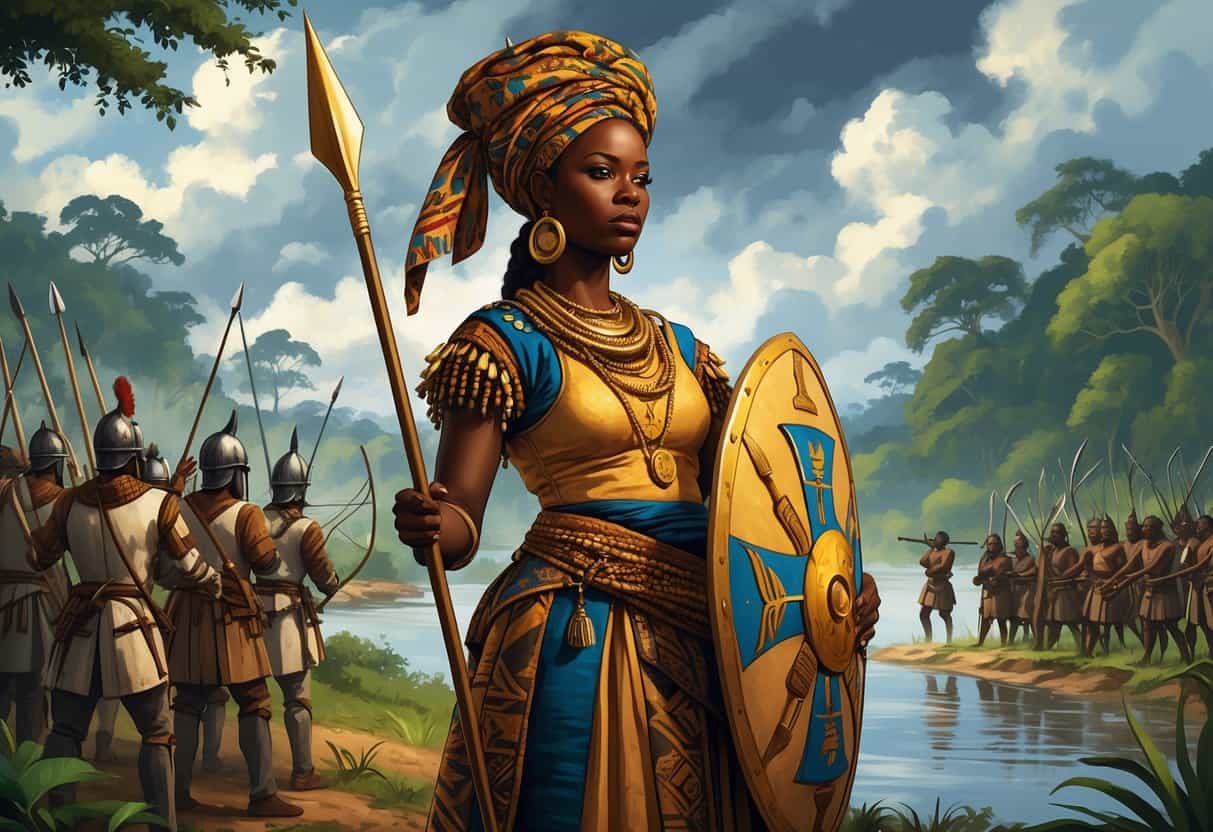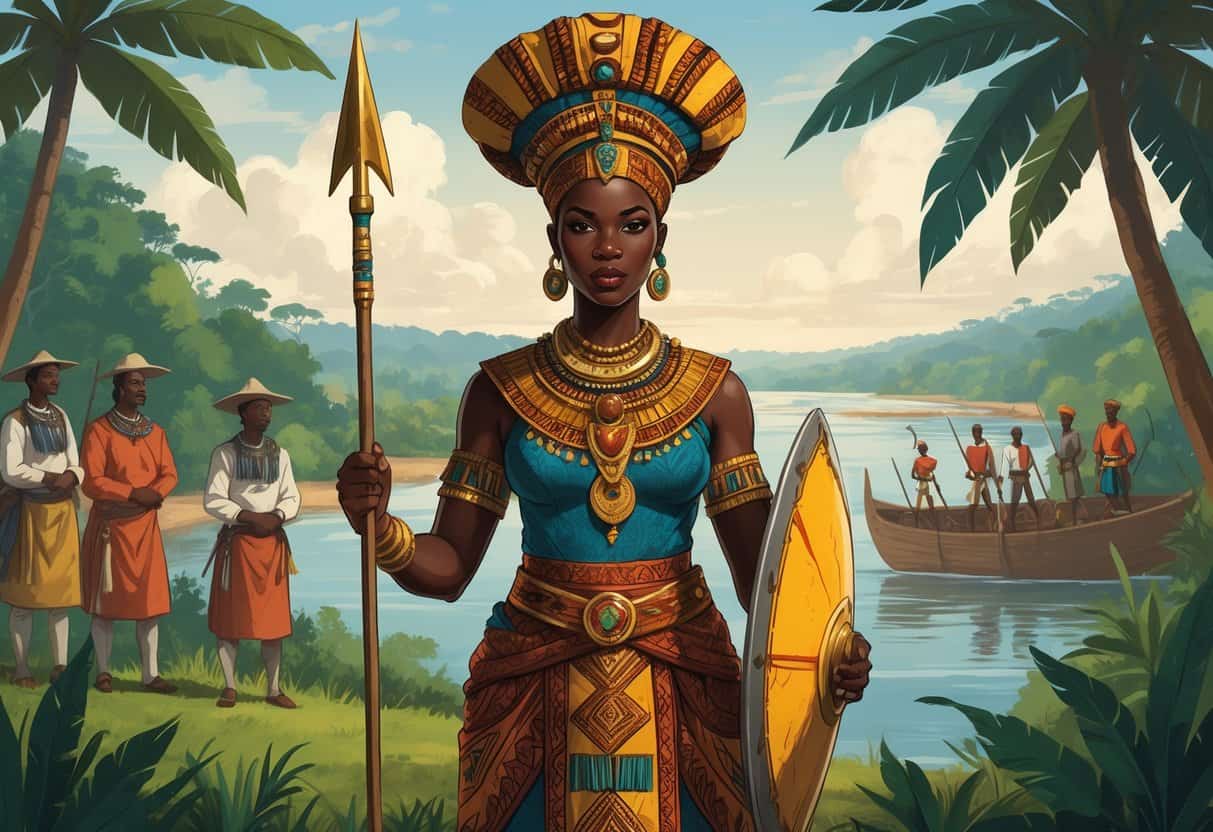Queen Nzinga was a powerful leader who fought hard to protect her people from Portuguese colonizers in Central Africa. She used both smart diplomacy and strong military tactics to resist their control.
Her ability to combine negotiation and battle strategies made her one of the most effective African leaders fighting against European colonization.

Nzinga led her people through years of conflict, making alliances and using wit to defend her kingdom. Her story shows how one leader can impact history by standing firm against powerful invaders.
Understanding her resistance helps you grasp an important chapter in the fight against colonization.
Key Takeways
- Nzinga rose to power by uniting her people against outside threats.
- She used diplomacy and military action to fight Portuguese forces.
- Her leadership left a lasting impact on African resistance.
Queen Nzinga’s Background and Rise to Power

Nzinga’s family origins, the political chaos in her region, and her rise to lead two important African kingdoms all shaped her approach to resisting the Portuguese. This background gave her the grit to stand up to colonizers and protect her people’s land.
Early Life and Family
Queen Nzinga was born in the late 16th century into the royal family of the Kingdom of Ndongo in what is now Angola. She was the daughter of King Kiluanji and part of a royal line linked to other Central African kingdoms.
Her brother ruled Ndongo before her. Nzinga grew up learning the politics and customs of her people, gaining support through family ties.
She was known to be smart and ambitious from a young age, already preparing herself for leadership.
Political Landscape of Ndongo and Matamba
During Nzinga’s time, the Kingdom of Ndongo faced threats from the expanding Portuguese, who wanted to control land and the slave trade. Ndongo’s power was tied to its grip on trade routes and alliances with neighbors.
To resist the Portuguese, Nzinga later allied with Matamba, another African kingdom against European control. Matamba became the base for her military and diplomatic moves.
The kingdoms were part of a web of African societies in Central Africa, all feeling the pressure of European influence.
Ascension to Leadership
Nzinga became queen after her brother’s death and a period of political struggle. She first acted as a diplomat, negotiating with the Portuguese to keep peace.
When talks failed, Nzinga turned to military resistance, leading her armies in battles against colonizers. Her skill in both war and negotiation helped her become a respected leader of Ndongo and later Matamba.
Nzinga ruled these kingdoms for decades, using clever strategies to protect her people’s independence.
Resistance Against Portuguese Colonization
Queen Nzinga resisted Portuguese colonization through sharp diplomacy and bold military actions. She navigated alliances, fought off Portuguese forces, and dealt with the growing influence of the Atlantic slave trade.
Her efforts shaped the history of Angola and its place in the wider Atlantic world.
Diplomatic Strategies and Alliances
Queen Nzinga used diplomacy to strengthen her position. She formed alliances with neighboring African states and rival groups.
Nzinga also negotiated with the Portuguese to buy time or gain better terms when she could. To secure support, Nzinga aligned with the Dutch, who were enemies of the Portuguese.
This alliance helped in resisting Portuguese control over Luanda and the region. She also presented herself as a leader who could command respect, even adopting symbols and roles traditionally held by men in her society.
This gave her more authority to speak and act on behalf of her people. Her diplomacy was flexible.
When peace was valuable, she made treaties. When war was needed, she prepared for battle.
This balance helped her protect her kingdom from total Portuguese conquest.
Military Campaigns and Tactics
Nzinga’s military tactics show a leader who avoided direct clashes unless she had an advantage. She used guerrilla warfare, attacking Portuguese supply lines and settlements.
Nzinga led forces that fought Portuguese troops on land and sometimes attacked their forts, especially around Luanda. She used her knowledge of the local terrain to her advantage, making it harder for Portuguese forces unfamiliar with the area to win.
Her armies included both infantry and cavalry, often coordinating quick strikes and retreats. This strategy slowed Portuguese expansion and kept her people fighting for decades.
Despite being outgunned, Nzinga’s persistence forced the Portuguese Empire to work hard to keep control of Angola and the Kongo. She maintained strong defenses around important cities and trade routes, including those tied to the growing slave trade.
Role of the Atlantic Slave Trade
The Atlantic slave trade affected Nzinga’s resistance deeply. The Portuguese relied heavily on the slave trade to Brazil and other colonies for wealth and labor.
Nzinga fought against Portuguese attempts to capture and sell her people into slavery. She also tried to control the flow of slaves from her territories to protect her population and weaken Portuguese economic power.
Her resistance disrupted Portuguese access to important slave trading ports like Luanda. This pushed the Portuguese to increase military efforts to take control of the African coast and its resources.
Nzinga’s interactions with the slave trade forced her to navigate complicated alliances, balancing between resistance and survival in a region shaped by European demand for slaves.
Impact on Sub-Saharan Africa
Nzinga’s fight shaped the political and social landscape of Sub-Saharan Africa. She inspired other African leaders and peoples to resist European colonization and slaving raids.
Nzinga kept parts of Angola out of full Portuguese control for many years. This resistance slowed the Portuguese conquest and proved that African states could push back against European powers.
Her leadership challenged the spread of the Portuguese empire along the African coast. It also influenced the politics of neighboring kingdoms like Kongo, which were caught between cooperation and conflict with Portugal.
Nzinga’s story is part of the wider Atlantic world history, where European powers, African states, and American colonies were all tangled together by trade, war, and culture.
Legacy and Influence of Queen Nzinga
Queen Nzinga’s leadership shaped the fight for freedom and identity in Angola and African societies. Her actions influenced later independence efforts and left marks on local cultures.
Effects on Independence Movements
Modern movements for independence in Angola often look back to Queen Nzinga’s example. She showed how strategic diplomacy and military resistance could challenge colonial powers.
Her fight against Portuguese colonization inspired later African leaders seeking to end foreign rule. Nzinga’s ability to unite different indigenous peoples, including the Mbundu, set a model for diverse groups working together.
Her leadership encouraged the Republic of Angola’s struggle for independence centuries later. You might see her legacy reflected in political speeches and independence rituals, where she’s remembered as a symbol of resilience and sovereignty.
Cultural Impact on Angola and Beyond
Queen Nzinga influenced more than just politics. Her legacy lives in the diverse cultural traditions across Angola.
Some African-American cultural practices connect back to Angola’s history, including stories passed down about strong leaders like Nzinga. You also find her impact in creole languages spoken in Angola, where African and Portuguese roots mix.
These languages carry the memory of colonial resistance and cultural blending. Nzinga’s story supports pride in indigenous peoples and African heritage.
She represents strength in the face of outside control, which continues to shape arts, music, and cultural identity in the region.
Modern Interpretations and Historical Reputation
These days, opinions about Queen Nzinga can really vary depending on where you look. Some folks see her as this fierce warrior queen, a real icon of anti-colonial resistance.
Others are more interested in her diplomatic moves and sharp political instincts. Her story keeps popping up in academic research, classrooms, and even pop culture, which is honestly pretty cool.
People are starting to notice just how complex African history actually is. Nzinga’s often pointed to as a standout example of gutsy leadership.
If you dig into her life, you start to get a sense of how African societies pushed back against colonization. Maybe it even makes you wonder how these stories still shape who we are now.